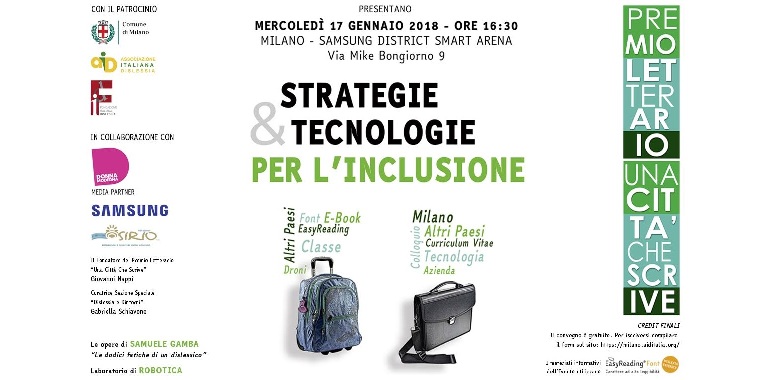Strategies & technologies for inclusion
Wednesday 17 January 2018 in the Samsung District in Milan a conference to discuss dyslexia in the workplace, with the patronage of AID, FID and the City of Milano.
The weekly Donna Moderna is the media partner of the initiative
In Italy around 3% of children and teenagers are dyslexic. Dyslexia is considered as a Specific Learning Disorder and has been recognised by Italian law (n. 170 of 8 October 2010) which defines the condition, protects the right to study of sufferers and provides guidelines for schools on teaching methods. After years of research, much progress has been made, but after school-age how is inclusion guaranteed in the working world? Are companies prepared to deal with the issue?
In order to create a space to discuss the problem, on Wednesday 17 January, at 4.30 pm, at the Smart Arena in the prestigious Samsung District in Milan, a conference has been arranged with the title “Strategies and technologies for inclusion”, with the patronage of AID (Associazione Italiana Dislessia), FID (Fondazione Italiana Dislessia) and the City of Milan. Donna Moderna, the Mondadori Group women’s weekly, edited by Annalisa Monfreda, is the media partner of the initiative.
The aim is to create an opportunity to promote and spread a culture of inclusion.. Sergio Messina, specialist in child neuropsychiatry and Chairman of the Italian Dyslexia Association (AID) declared: “There is still a great deal of work to do to encourage the educational and social inclusion of dyslexics, but the Association has already done a great deal and, in the last 20 years, achieved important results, including the approval of legislation , the first to recognise and protect the right to study, also through the use of compensatory tools.”
The focus of the conference will be on consolidated experience in education and the workplace in Italy, with a panorama of the international scenario and specific reference to the situation in the English-speaking world.
Examples of virtuous inclusion, in which technology plays a leading role. “The aim of Samsung is to improve the experience and lives of people thought cutting-edge solutions able to inspire the world: our priorities include making all of our technological know-how available to society in order to meet the widest range of needs. We are aware how much technology can be a powerful tool for emancipation and social inclusion, and we have direct experience through many projects that we have developed in recent years, such as our Schools in Hospitals activities,” commented Antonio Bosio, Product & Solutions Director at Samsung Electronics Italy.
But technology alone is not enough. It is “a tool” to help dyslexics to overcome their difficulties, but the real driver of change is the right information.
This is why Donna Moderna, a magazine that has always been sensitive to social issues, covers the dyslexia issue with ad hoc projects (like the longform piece on its website www.donnamoderna.com/news produced in collaboration with Lancôme and AID) and its support for the idea behind the conference. “Dyslexia affects some 2 million people and 350,000 families of school-age children in Italy. The families are often faced with conflicting diagnoses, teachers that often do not have adequate tools to support dyslexic children and the children themselves who suffer also from authentic crises of self-esteem by being misunderstood, not being involved in projects to promote inclusion and not being appreciated,” said the editor of Donna Moderna, Annalisa Monfreda.
The conference is the result of an idea by Gabriella Schiavone, curator of the “around dyslexia” section of the literary competition “Una Città Che Scrive” (A City that Writes), conceived by Giovanni Nappi. In its 2018 edition, the competition, which was born in Casalnuovo di Napoli, has a special section for specific learning disorders. “The power of writing emerges in all of the stages of our competition. In “Una Città Che Scrive”, writing becomes an opportunity for individual and social redemption; a form of cultural inclusiveness. With its Special Section for Dyslexia, and separate efforts for our autistic friends and a painting competition reserved only for them, we are attempting to respect the noblest principles of social inclusion, “declared Giovanni Nappi.
Speakers include, Pierfrancesco Majorino, Head of Social Policy, Health and Rights of the City of Milan, IBM Italia and Axia, among the first companies in Italy to have adopted a “Dyslexia Friendly” label. The conference speakers also include the creators and supporters of the EasyReading font that ensures readability for all, including dyslexics. Consequently, all of the material distributed during the conference on Wednesday 17 January will use this highly accessible font.
There will also be contributions from teachers and researchers, as well as direct testimonials from brilliant young students who have entered the world of work.
A limited number of places for a robotics laboratory using augmented communication methods will also be available for children.
Although the event is free, there are a limited number of places. To register please sign up at: https://milano.aiditalia.org
